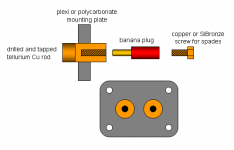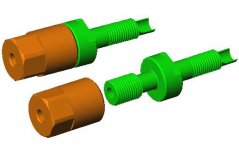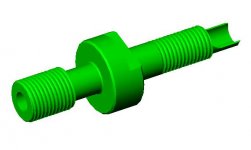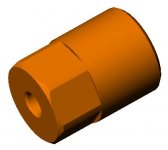Lots of clever people here that have plenty of advice for those that actually make stuff.  I admire you people of action who do more than talk!
I admire you people of action who do more than talk!
I don't think McMaster has an India branch.
BUT I'm sure in the cities you can get anything.
I suspect the BeCu is easier to machine and stronger.
I also imagine pure Cu would sound fine.
If you are having a shop make these and If they can make them at a reasonable price with shipping and profit, I'm sure there would be interest in a group buy They could be shipped to one person, who could distribute them as has been done with other products.
If you are making them yourself I suspect you won't want to make a bunch!!!!
I don't think McMaster has an India branch.
BUT I'm sure in the cities you can get anything.
I suspect the BeCu is easier to machine and stronger.
I also imagine pure Cu would sound fine.
If you are having a shop make these and If they can make them at a reasonable price with shipping and profit, I'm sure there would be interest in a group buy They could be shipped to one person, who could distribute them as has been done with other products.
If you are making them yourself I suspect you won't want to make a bunch!!!!
McMaster-Carr also sells oxygen-free copper (Alloy 101) and chromium copper (Alloy182 Specialty) also looks interesting but expensive. You might think about just using a standard rod size and only maching two opposed flats on the end for mechanical tightening. This would cut down on your machining costs. 
Im curious how you think you will be terminating your speaker cables. Being that your ready to take the leap and machine your own hardware, you have the opportunity to build something optimized for your needs.
The direction your heading looks great. I would expect that your using spade lugs with them. Have you considered over sizing the nuts or adding a knurled section to them to make them easier to hand tighten?
A very simple nut could be made by putting a threaded hole in the center of a piece of bar stock. It would be very easy to finger tighten. This of course will increase the spacing between the posts.
The direction your heading looks great. I would expect that your using spade lugs with them. Have you considered over sizing the nuts or adding a knurled section to them to make them easier to hand tighten?
A very simple nut could be made by putting a threaded hole in the center of a piece of bar stock. It would be very easy to finger tighten. This of course will increase the spacing between the posts.
Peter Daniel said:He said, he expects the cost to be around $2. It is much less than Cardas. Comparing to Cardas, yours don't accept banana connectors, but this is not a big problem.
My bad, I guess I should have done more than just skim read.
Jeff
Thanks all for the info
> let me build one proto. Perhaps the group buy issue can be explored thereafter. In any case the landed cost in US should not be more than $10 to warrant a preference over Cardas. And yes I have a plant here manufacturing automotive components for OEM's. We usually work with a variety of material (20MnCr5 etc) but no copper.
either that or BeCu it will be. Pure copper in bar form is a bit of problem here.Peter Daniel said:...tellurium copper..
> your idea is important..makes things easier.Variac said:... clever people...
> let me build one proto. Perhaps the group buy issue can be explored thereafter. In any case the landed cost in US should not be more than $10 to warrant a preference over Cardas. And yes I have a plant here manufacturing automotive components for OEM's. We usually work with a variety of material (20MnCr5 etc) but no copper.
My choice of material is largely dictated by what is available locally and reasonably cheap. But I wish to pursue this option.Philo said:...oxygen-free copper
My current set of speakers have the lead soldered onto the cross over directly. But I think this binding post can be utilised at the speaker end as well. Please comment on this.Da5id4Vz said:...how you think you will be terminating your speaker cables.
Thanks for this very clear drg. Ok now I get it. Its either banana plug or the spade.ultrachrome said:.... here's a shot of what it might look like.
actually the US$2 figure is just a guesstimate. Could be slightly more if the earlier mentioned copper alloy is used.Milzie said:
..My bad..
oops, maybe it was tulurium copper not berylium copper.
I really don't know what I am talking about, except that some alloys seem more desireable. Might be more about machinability than electronic performance.
I think the price depends on the quality of the final product. If they are really pretty like the Cardas, then they are worth more. If perfectly functional but not as well made then they might be still desireable but have to be cheap.
I think the majority of peole use spade connectors on their speaker leads. Maybe that's all you need to accomodate
As you said, lets see how they come out....
I really don't know what I am talking about, except that some alloys seem more desireable. Might be more about machinability than electronic performance.
I think the price depends on the quality of the final product. If they are really pretty like the Cardas, then they are worth more. If perfectly functional but not as well made then they might be still desireable but have to be cheap.
I think the majority of peole use spade connectors on their speaker leads. Maybe that's all you need to accomodate
As you said, lets see how they come out....

That is exactly what I think. A pure DIY approach. Having said that all efforts must be made to ensure a top notch build quality as well. After all we are cloning a Cardas hereVariac said:If perfectly functional but not as well made then they might be still desireable but have to be cheap.
I now have a pretty good picture of the Cardas specs (thnks to Peter Daniel), so should be able to present a revised drg for your approval soon.
DIY Binding posts
Corbato,
While you're at it - why not make some out of silver or a high silver alloy? I can't imagine that it would be much more expensive than a fancy copper alloy - especially if you have to import it. If the machining cost is $2 - you could have a business going selling to the DIY'ers here on hte forum.
Mike
Corbato,
While you're at it - why not make some out of silver or a high silver alloy? I can't imagine that it would be much more expensive than a fancy copper alloy - especially if you have to import it. If the machining cost is $2 - you could have a business going selling to the DIY'ers here on hte forum.
Mike
Re: DIY Binding posts
Actually machining silver or silver cadmium alloy is a different ball game all together. Never done that in the past. But certainly worthwhile to pursue. Can you suggest the exact alloy?
thanks
sangram[/i] [B] Book some for me... Mike [/B][/QUOTE] yaar proto ready hone do...phir dekthe hai'n:) Give me till wednesday to have the revised proto as per Peter Daniel's measurement. [QUOTE][i]Originally posted by mgreene said:Corbato,
... why not make some out of silver or a high silver alloy?
Mike
Actually machining silver or silver cadmium alloy is a different ball game all together. Never done that in the past. But certainly worthwhile to pursue. Can you suggest the exact alloy?
thanks
Silver posts
Hi,
I mentioned alloys just as a lower cost alternative - i.e., sterling. I would assume that most audio types would prefer as pure a grade of silver as practical for you.
If there are no export problems to surmount, I actually need several sets of posts myself and would be the first in line if you were to make such a post at a good price
Regards
Mike
Hi,
I mentioned alloys just as a lower cost alternative - i.e., sterling. I would assume that most audio types would prefer as pure a grade of silver as practical for you.
If there are no export problems to surmount, I actually need several sets of posts myself and would be the first in line if you were to make such a post at a good price
Regards
Mike
Corbato: Based on my own informal listening tests, may I suggest that you make the nut from a non-conductive material? For the nut portion I would suggest materials like micarta, delrin, vaalox, and polypropylene.
If the final results both sound good and look good, I may want to order some pairs. Are you working out your pricing for quantity orders? I am in Japan.
I am in Japan.
regards, jonathan carr
If the final results both sound good and look good, I may want to order some pairs. Are you working out your pricing for quantity orders?
regards, jonathan carr
Warning
Beryllium copper can be a very hazardous material while being machined or otherwise worked. Actually it's the beryllium that's the nasty I think so this would be equally true of all beryllium alloys.
I think the reason it is used quite a lot is that it has a high fatigue strength and can be tempered. A common application is for springs. As with all alloys, the properties, both mechanical and electrical, will vary with the alloy so you will need the right alloy to optimise for high conductivity.
As far as I know it is perfectly save when handled (or even injested), the problem is associated with inhalation of dust, particles or vapour. Most people are not affected but those that are can develop chronic beryllium disease which can take years to develop and can be fatal. My advice is, do NOT work this material unless you are sure you know what you are doing, how to protect yourself and clean up properly afterwards.
Stick with pure copper.
Beryllium copper can be a very hazardous material while being machined or otherwise worked. Actually it's the beryllium that's the nasty I think so this would be equally true of all beryllium alloys.
I think the reason it is used quite a lot is that it has a high fatigue strength and can be tempered. A common application is for springs. As with all alloys, the properties, both mechanical and electrical, will vary with the alloy so you will need the right alloy to optimise for high conductivity.
As far as I know it is perfectly save when handled (or even injested), the problem is associated with inhalation of dust, particles or vapour. Most people are not affected but those that are can develop chronic beryllium disease which can take years to develop and can be fatal. My advice is, do NOT work this material unless you are sure you know what you are doing, how to protect yourself and clean up properly afterwards.
Stick with pure copper.
- Status
- This old topic is closed. If you want to reopen this topic, contact a moderator using the "Report Post" button.
- Home
- Loudspeakers
- Multi-Way
- DIY Speaker Binding Post



